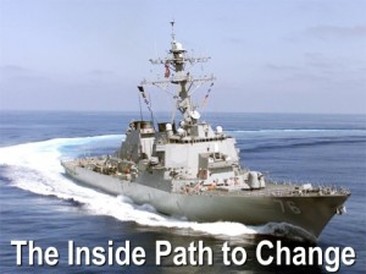In 1969 I graduated from college and within a few days received notification that I was required to report for my induction physical. The Vietnam War was still raging and every night the news was filled with body counts from both sides; it was a frightening and tumultuous time both for our country and for me.
I was recently married and fortunate enough to have been accepted into grad school that Fall, but our country needed more and more bodies to fight the war and deferments had run out for me.
Reporting for my physical, I boarded a bus in my hometown with about 30 other guys; a few were acquaintances from high school. We traveled a few hours to the induction site. The bus was very quiet; not much talk at all. Everyone was somber and seemed to be contemplating their future. Where will I be a month from now? we all wondered. We were commanded to get of the bus and line up. There had to be more than 300 boys, all there for the same reason. Guys in uniform were yelling and pushing us from one station to another. Much of the examination took place in large rooms. It was my first taste of military life.
Under my arm I carried a large brown manila envelope that contained x-rays from three knee surgeries I had during my senior year of high school and first year of college, a result of playing football. Except for my knees I was in perfect health. Although my knees eventually forced me to quit playing football in college, I was still able to run and be athletic. I thought surgeries might disqualify me, but in 1969 the rumors were that only being disabled would keep you from passing.
As I was standing in line I was approached by an aggressive man in uniform who yelled, “What’s in that envelope, boy!” Before I could answer he grabbed it out of my hand and left without a word. I wanted to protest, but it was obvious this was not the time or place to protest or put up a fuss; it could only lead to something I wasn’t ready to handle. My orders were simple and didn’t need to be verbalized: keep my mouth shut, follow the person in front of me and stay on the yellow line. Stop whenever I’m told and do whatever I’m commanded to do.
At some point later in the day I was pulled out of line and told to report to an office at the far end of the room. I knocked on the door and a voice commanded me to come in. The person behind the desk said, “Sit down.” He asked me to identify myself and then told me to drop my pants! As I was unbuckling I noticed he had my x-rays on the desk. He then asked me to stand up on a stool, and as I did he looked at the surgical scars on both my knees. “Get down and pull your pants up. You’re through.” He put the x-rays back in the envelope and told me I was unfit for duty and to report to my station and wait for my bus to leave.
I sat very still for about another hour before the contingent from my hometown finished the process. We boarded and headed home. About 30 minutes later it started to sink in. I wasn’t going to be drafted and in a few months I’d be attending classes instead of learning to survive in the jungle. I wanted to laugh and stand up and yell with relief, but didn’t because surely no one else on that bus was feeling as joyful. In fact, that ride home was one of the most difficult ninety minutes I have ever experienced in my life. It was obvious that I was the only person on that bus who knew what his fate would be. Everyone else was once again in deep contemplation. There were occasional laughs and remarks – “Can you believe what just happened?” “I’ve never been through anything like that in my life.” “Did you see that guy crying in the corner?” As soon as these words would leave someone’s lips, most knew more days like this waited ahead.
The war came to an end a few years later. I graduated from grad school and took my first job; I was on my career path. Over the years I noticed that I would experience a sense of guilt and remorse about not being part of the war. I felt like I didn’t do my duty. I had escaped; I chickened out. I had hid while others took my place.
In the mid-80s I moved to the Washington DC area and after work one evening I decided to visit the Vietnam War Memorial. I had heard so much about it – how it was a healing place for many. But for me it only deepened my sense of guilt about not having fulfilled my duty. I never let anyone in on these feelings and thoughts. They didn’t haunt me over the years, but they would certainly visit. And although I knew it hadn’t been my decision not to serve, that didn’t stop the guilt from returning.
In 2003 I had the good fortune to work with 6 Seconds on a project for the US Navy and Marine Chaplains Corp. It was to develop a program to equip chaplains with the tools to be effective change agents. They are key influencers and resources to captains, commanders and the men and women who look to them for solace, guidance and forgiveness at sea and in battle.
For over a year I worked with chaplains from Norfolk, VA to Okinawa, Japan. At first I didn’t realize why this program took on such significance for me until we presented the pilot program in Newport, RI. In the opening introductions I realized I now had my chance to redeem myself, to serve my country and to heal my wound.
I would like to take this time to personally thank 6 Seconds and our team, and most of all the near-900 chaplains around the globe who invited me in and allowed me to share my story with them. We helped each other in ways that were much deeper and more important than how to become an effective agent for change and transformation. Every day they heal psychological and spiritual wounds and I’m very thankful to be one of the many they have touched.
I invite you to read the case study of this project. It’s an excellent description and demonstration of how emotional intelligence can be applied to help organizations and change agents effectively implement and steward change and organizational transformation.
Resources:
Military chaplain: Marines in Iraq look to pastor for answers to tough questions, Christian Science Monitor Article
Ministering to Soldiers, and Facing Their Struggles, NYTimes Article
EQ: Case Study, 6Seconds


 RSS Feed
RSS Feed
